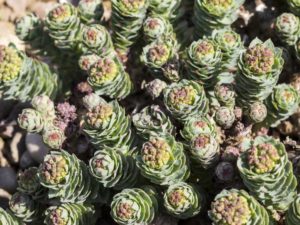Concern about medication side effects is often cited as the #1 reason many have turned to natural alternatives to treat depression. More and more natural options emerge as researchers, slowly but surely, produce scientific evidence of their effectiveness. What’s interesting is sometimes these “new” treatments are actually ones that people have used for centuries. Such is the case with Rhodiola rosea, or roseroot.
Uses for Roseroot
Roseroot is an adaptogenic herb, which I’ve previously written about in relationship to adrenal fatigue. It goes by several other names including rosewort, arctic root or Siberian golden root. People in Russian and Scandinavian countries have long used it to boost mental capacity as well as treat depression and fatigue.
Rhodiola rosea works in the central nervous system, helping preserve levels of neurotransmitters such as serotonin, dopamine, and norepinephrine. It is thought to stimulate the receptors for these neurotransmitters, which all play a role in your mood.
It tends to produce only mild side effects, which may include dry mouth.
Studies on Roseroot for Depression
A 12-week study, published in Phytomedicine in 2015 showed that roseroot was slightly less effective than a common pharmaceutical antidepressant, but caused far fewer side effects. Dr. Jun J. Mao at the University of Pennsylvania’s Perelman School of Medicine led the randomized, double-blind, placebo-controlled, comparison trial. They studied 57 adults who displayed mild symptoms of depression for at least two weeks.
The patients taking roseroot had 1.4 times the odds of improvement versus a placebo. Patients taking sertraline (brand name Zoloft) had 1.9 times the odds of improvement. Although the sertraline performed slightly better, 63% of the sertraline patients reported side effects compared with just 30% of the roseroot recipients.
 Studies of Rhodiola rosea look at not just depression but other illnesses for potential treatment. Researchers at UCLA studied 10 people with generalized anxiety for 10 weeks in 2008. They reported significant improvement in symptoms with mild or moderate side effects. Another study, published in the Journal of Alzheimer’s Disease showed that a key compound in roseroot improved memory and enhanced mood in mice.
Studies of Rhodiola rosea look at not just depression but other illnesses for potential treatment. Researchers at UCLA studied 10 people with generalized anxiety for 10 weeks in 2008. They reported significant improvement in symptoms with mild or moderate side effects. Another study, published in the Journal of Alzheimer’s Disease showed that a key compound in roseroot improved memory and enhanced mood in mice.
Research on roseroot for depression is still limited, but looks promising overall. In 2016, a study published in Phytomedicine reviewed all existing animal and human studies. The researchers concluded that “R. rosea demonstrates multi-target effects on various levels of the regulation of cell response to stress, affecting various components of the neuroendocrine, neurotransmitter receptor and molecular networks associated with possible beneficial effects on mood.”
They also noted that “In contrast to most conventional antidepressants, R. rosea extract appears to be well-tolerated in short-term studies with a favorable safety profile.”
Conclusions
Since each individual is unique, more treatment options means a better chance of each patient finding the ideal solution for his or her problem. Research on natural remedies like roseroot can only increase. There is still much room to learn about roseroot as a treatment for depression, but it looks like a good bet that you’ll see more people trying this herbal supplement in the future.
—
Photo credits:
- ggaallaa / bigstock.com
- Samphire / bigstock.com








